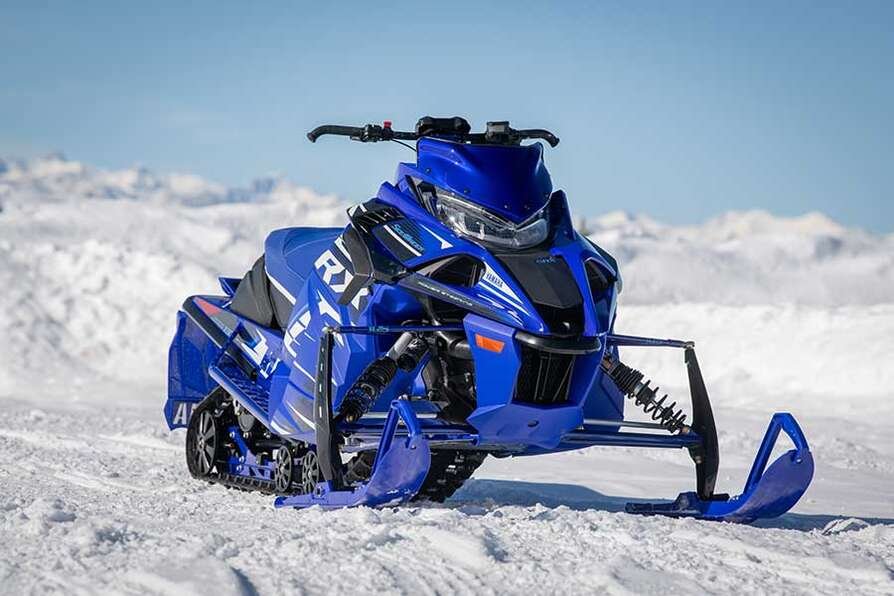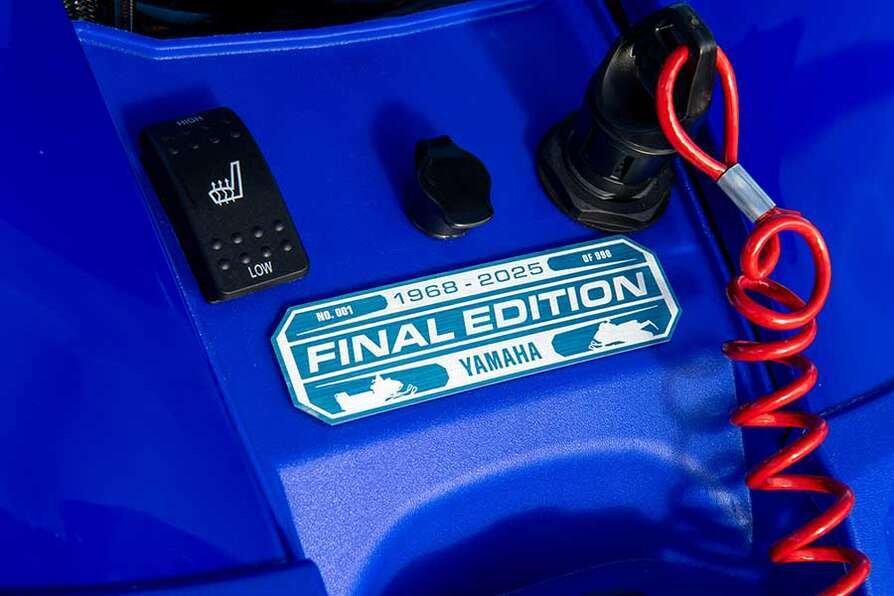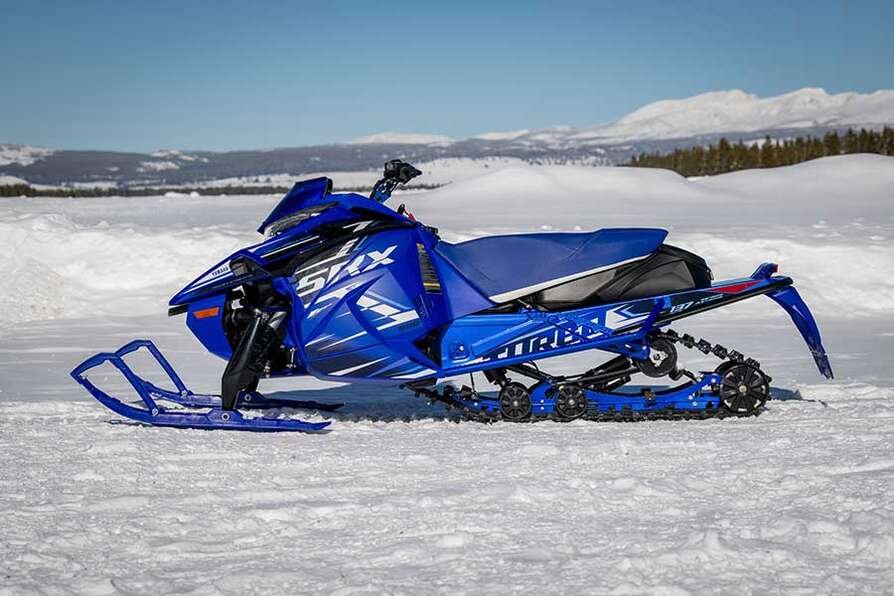TOP - The turbo boosted, one-litre triple is unmatched when it comes to delivering incredible power with the refinement and quality you have come to expect from a Yamaha. Designed around a premium turbo unit, every engine component from intake to exhaust is dedicated to producing uncompromised performance. The proven Yamaha turbo has earned the respect and reputation befitting the industry's highest achiever. This engine produces the potent venom in the Sidewinder's bite.
- Fox Intelligent Quick Shift (iQS) shock absorbers are employed up front and on the rear arm. Suspension can be adjusted on the fly using a left-hand mounted switch on the bars. Compression damping is offered in three very noticeable steps from soft to firm. Once activated the SCU (suspension control unit), located on the shock body, alters the oil flow within all applicable shocks in less than one second allowing the rider to dial in suspension feel to the running conditions. The shock setting is clearly displayed in the left-side digital gauge once the selection is made. There are also two 'driver' select modes which can be preset and held in memory to change the overall settings in one step. Rebound damping is preset, remaining constant to control kick-back and 'packing' in the rough, regardless of the iQS compression selection.
- The ARCS front suspension features tall, high-strength, forged alloy spindles and lightweight upper A-arms. The geometry is designed to optimize suspension function while increasing ground clearance. This results in greater bite with less chassis roll for more predictable and consistent handling.
- The SRX utilizes special suspension calibration with dual-rate front shock springs, The lower profile enhances top speed performance while helping keep the sled level in tight corners. The softer initial spring rates are consequently more progressive, ramping up deeper in the stroke to resist harsh bottoming while full travel is still available when unweighted. The SR 137 skid remains a 'coupled' suspension that utilizes a unique sliding front arm mount. With up to half-inch of movement at the front arm slot, the system allows the SR 137 to deliver controlled (reduced) ski-lift during acceleration while still retaining front arm bump compliance. The solid rear axle design and large diameter rear wheels provide maximum strength while special front idler wheel layout increases clearance for iQS, plus reduces friction for greater durability and performance.
- The Yamaha designed single keel ski strikes the elusive balance between lightweight steering effort and precision handling over a wide range of snow conditions. Special staggered carbides further enhance steering response. A unique shim pad assembly works in conjunction with the rubber saddle block to adjust the carbide pressure point. Overall ski stance is also adjustable by relocating the thick spacer located on each ski axle to the opposite side.
|
PERFORMANCE - The nickel alloy turbine body is extremely strong and precise, able to withstand highly elevated temperatures. Supported by premium, ceramic ball bearings, the Inconel turbine blade assembly is very light and strong. This yields a low moment of inertia for lightning quick response to exhaust gas input. Triple throttle bodies are used exclusively to further enhance the quick delivery of compressed air from the impeller to intake valves.
- The Yamaha-developed Mitsubishi ECU uses a series of nine sensors to gather running condition data which it computes using a predetermined memory ‘map’. It then adjusts ignition timing, fuel delivery, manifold air pressure and turbo boost pressure to produce maximum performance under any condition—reliably.
- Yamaha engineers wanted an engine that's exceptionally quick to respond with little or no 'lag' as found in a conventional turbo. One of the ways they achieved their goal was to develop an intake system using three separate throttle bodies positioned very close to the intake valves, instead of just one feeding long intake tubes. It’s an innovation not seen in any other production turbo on the planet. And another first for Yamaha with the Genesis turbo.
- Unlike conventional turbo 'blow-off' valves, the Yamaha ABV redirects air pressure back into the intake side of the compressor to prevent surge and help maintain impeller speed, resulting in ready acceleration and seamless power delivery.
- Engine coolant is circulated through the turbocharger to control both under-hood temperature and help cool the intake charge. Upon engine shut down, the convection energy produced by super-heated coolant at the turbo head keeps it circulating without the coolant pump in operation. This eliminates the need for an engine cool-down cycle while maintaining high durability in the turbo components.
- The YSRC primary and roller secondary clutches are calibrated for durable, cool operation. They harness and transfer the massive torque produced by the Genesis Turbo efficiently to the track while minimizing drive belt wear. The primary shifts out aggressively to use all the power on tap while the roller secondary is quick to back-shift and provides additional ratio through its oversize sheaves to keep accelerating long after the others have signed off.
- A dual-piston brake caliper applies braking forces directly to the drive shaft and is mated to a wave-style, lightweight drilled rotor. The LE-only rotor removes one pound of rotating mass from the vehicle's driveline, helping transfer all of the Sidewinder's available horsepower to the snow. The 'Stealth' master cylinder and composite 'Stealth' brake lever offer excellent modulation and feel with ergonomically precise operation.
|
HANDLING - The SRV chassis layout was engineered with the goal of centralizing mass. Approximately 60 percent of the sled's weight is tightly centered within the main triangulation. The result is a quick-handling, well-balanced sled that's fun to throw around in a wide variety of conditions.
- The SRV chassis combines a load-bearing triangulated structure with lightweight aluminum construction to create a neutrally balanced sled that's centered on the rider. The pyramidal upper frame creates chassis strength without excessive weight.
- The SRX uses a 137-inch long, fully clipped configuration. The lower lug profile yields less wind resistance at high speed while the fully clipped track reduces friction to provide maximum top speed performance. Additionally, the low lug reduces weight and stress on the track for improved durability and performance at sustained high speeds.
- The straight steering post on the Sidewinder is configured over the engine. It connects to a single bell crank for simplicity and light weight. The design also minimizes free-play in the steering system and delivers a tight turning radius.
|
COMFORT - The Sidewinder's lightweight, two-piece, tapered tunnel gives you strength for the long haul and a tapered fit for enhanced leg comfort and overall ride positioning. The reinforced running boards are punched with aggressive boot-hold serrations and offers excellent snow evacuation to keep your feet planted where you want them.
- A standard heated seat provides the ultimate in warmth and comfort on even the coldest winter days. A simple flip of the dash-mounted switch enables the choice of two warmth settings, allowing you to explore what lies beyond that next curve from sun-up to sundown in complete comfort.
- The handlebar controls feature a left-hand switch cluster which allows for 'on-the-fly' access to the multi-step hand and thumb warmer adjusters. Information available on the multi-function gauge can be easily selected with a convenient toggle switch and the push button electric start, reverse gear switch is also located in the left-hand cluster. The right side of the bar is clean with an ergonomically shaped throttle lever and simple, stand-alone engine stop switch. The Hayes 'Stealth' brake cylinder is equipped with a composite brake lever providing great modulation for better feel and powerful stopping performance.
- Additional storage is provided by a convenient tunnel bag. The semi-rigid design is easy to access and water resistant to keep your spares safe and dry. Quarter-turn, quick release fasteners are provided to make removal a snap.
|

















The final Sidewinder SRX LE EPS. The fastest snowmobile on snow. This iconic snowmobile holds championships around the world and it holds the respect of even die hard 2-stroke riders. To be an owner of one of these final edition SRXs in traditional Yamaha Blue colour way will be a coveted ttile in the snowmobile community.